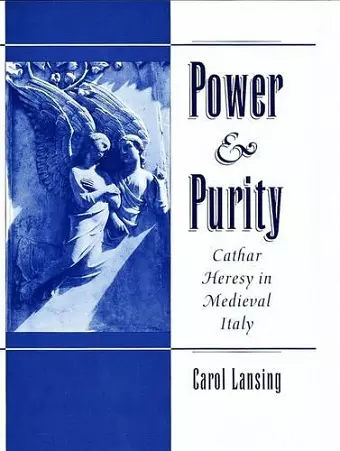Power & Purity
Cathar Heresy in Medieval Italy
Format:Paperback
Publisher:Oxford University Press Inc
Published:25th Oct '01
Currently unavailable, and unfortunately no date known when it will be back
This paperback is available in another edition too:
- Hardback£93.00was £93.00(9780195063912)

Catharism was a popular medieval heresy based on the belief that the creation of humankind was a disaster in which angelic spirits were trapped in matter by the devil. Their only goal was to escape the body through purification. Cathars denied any value to material life, including the human body, baptism, and the Eucharist, even marriage and childbirth. What could explain the long popularity of such a bleak faith in the towns of southern France and Italy? Power and Purity explores the place of cathar heresy in the life of the medieval Italian town of Orvieto. Based on extensive archival research, it details the social makeup of the Cathar community and argues that the heresy was central to the social and political changes of the 13th century. The late 13th-century repression of Catharism by a local inquisition was part of a larger redefinition of civic and ecclesiastical authority. Author Carol Lansing shows that the faith attracted not an alienated older nobility but artisans, merchants, popular political leaders, and indeed circles of women in Orvieto as well as Florence and Bologna. Cathar beliefs were not so much a pessimistic anomaly as a part of a larger climate of religious doubt. The teachings on the body and the practice of Cathar holy persons addressed questions of sexual difference and the structure of authority that were key elements of medieval Italian life. The pure lives of the Cathar holy people, both male and female, demonstrated a human capacity for self-restraint that served as a powerful social model in towns torn by violent conflict. This study addresses current debates about the rise of persecution, and argues for a climate of popular toleration. Power and Purity will appeal to historians of society and politics as well as religion and gender studies.
"Carol Lansing's book is a fine example of a local study that transcends its original scope by stimulating further reflection on the nature and function of heresy, and by implication on that of religion....A particular mention deserves Lansing's skilful reading of religious and political symbolism, which unveils the probable implications of a piece of rotten meat thrown at a procession a long time ago."--Sixteenth Century Journal
"The book makes valuable contributions to our understanding of the social context of Catharism in Orvieto and also the place of Catharism in the popular religiosity of the High Middle Ages...A worty contribution to scholarship on Catharism and medieval Italy." --Catholic Historical Review
"Lansing is judicious in describing what the records she analyzed do or do not contain....Lansing's book is highly recommended. It is beautifully written and carefully researched."--The Medieval Review
"Lucid writing and scrupulous documentation....the book is a persuasive reminder that understanding religious phenomena requires solid contextualization. Historians, social scientists, and scholars of religion will benefit from this splendid book."--Theological Studies
"This is an interesting and important book...This is a model study of how communities work."--Religious Studies Review
ISBN: 9780195149807
Dimensions: 212mm x 167mm x 20mm
Weight: 331g
288 pages